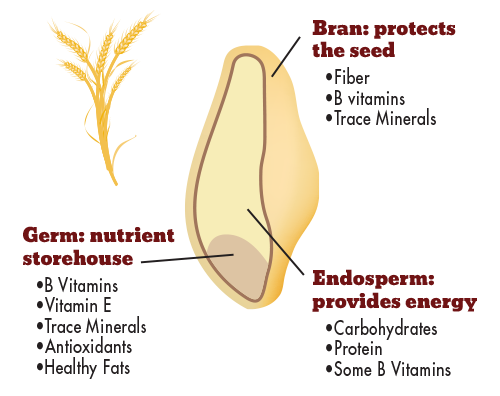The Seed
Whole30’s nutritional guidelines call for the elimination of grains in one’s diet, even whole grains. However it doesn’t mean that all carbohydrates are prohibited during the 30 days. This comes as a surprise because most assume “no grains” means no carbohydrates, but that is not the case, as there are plenty of carbohydrates one is able to eat, such as potatoes, which encourages participants to establish a more healthy mindset around what it means to eat “real food,” and to discover how real foods, not snack foods, can be satiating. Over the last 28 days, I have rarely opened my pantry, only to get a few mason jars or Ziploc bags. Also, when grocery shopping I have purchased more items around the perimeter of the store than I ever have, which would make any nutritionist proud. Prior to Whole30 I thought I mostly shopped around the edges of the store but I have come to realize how often I typically delved into the bulk section to pick up brown rice, quinoa, oats and other such times that were staples in my diet. For me, Whole30 has been an invitation to look on the other side of the nutrition fence. I have spent years as a vegetarian and vegan and Whole30 has given me the opportunity to understand my body a bit more and, in addition, given me more knowledge about the foods I typically eat, such as grains and legumes.
A grain is a seed, a whole grain kernel, from a cereal plant. The outside is called the bran, a fibrous protective layer, while inside contains the endosperm, the carbohydrate and gluten portion, and the germ, the plant’s reproductive material. A refined grain, such as white bread, strips the kernel of the bran, while whole grains naturally maintain all three parts. Of course, whole grains are preferred over refined, however, there are still concerns in eating the recommended whole grains.
The bran layer of the whole grain kernel contains what is known as phytates, the anti-nutrient. In It Starts With Food, authors Dallas and Melissa Hartwig discuss why whole grains are not as advantageous or as nutritious as we have been taught to believe; the phytates “grab hold of minerals like calcium, iron, zinc, and magnesium found in the whole grain, creating an insoluble and indigestible complex. This means that when these nutrients get to your small intestine, they are not in a usable form–therefore, not absorbed into the body” (112). This seed of information, in addition to testing it out myself by eliminating whole grains over the last 28 days from my diet, has opened my eyes even more to the importance of eating the foods that come directly from the dirt. Although potatoes contain this anti-nutrient in their skin, which can be peeled off, the nutrients that are readily available by the root vegetable are much greater than the amount of phytates present in the skin, making its resistant behavior, nil.
Food fads come and go but I am grateful for this food experiment, in particular, because it has empowered me to listen to my body more intently and to even question the validity of what makes certain foods, health foods. Just because someone is vegan or vegetarian does not mean that he or she is a model of health. Health is a combination of self-knowledge and self-love, with a touch of science. It is allowing others to plant a seed of doubt, inspiring one to find out the truth for herself and what works best for her body.
At the end of 2017, I read an article that gave a summation and rated all the diet trends. Whole30 was actually not highly recommended by the author, who called it “too restrictive.” In my experience, I feel the opposite. Whole30 has not been a restrictive diet but one that has opened many different doors, including how I spiritually, emotionally, and physically relate to food. It has planted seeds of new knowledge within my being while also nourishing the seed of my intention to explore my journey on this earth on a much deeper level within the framework of the body-mind connection. I have not only experimented with the elimination of the anti-nutrients call phytates, but also the other anti-nutrients that keep me from living a peaceful, healthy life, such as negative self-talk, unhealthy cravings, and the means by which I give things outside of myself power over me, for example, food or the opinions of others.
In the end, all we can ever do is follow the seeds that are planted in our hearts, those seeds that call us to awaken to our highest self. If the seed is pure, we will bloom and blossom like never before, embodying the characteristics that we hold dear. We do not have to worry about planting the seed, it is already done, all we must do is cultivate it and nourish it, not only with healthy food but also with unconditional self-love. Namaste.
Resources:
Hartwig, Dallas and Melissa. It Starts With Food. Las Vegas: Victory Belt, 2012. Print.
